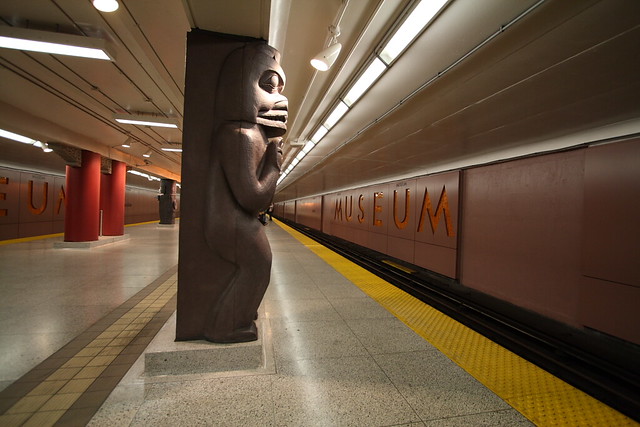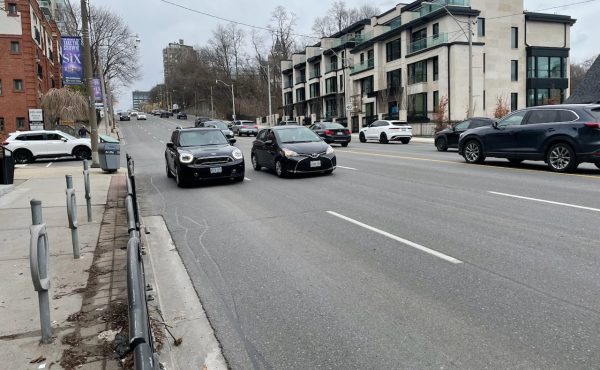
When the going gets tough, the tough get going. A far cry, maybe, from how Billy Ocean intended it, but this old English proverb loosely describes the state of transit management in North America’s two largest systems.
Just over a week ago, New York’s MTA Chairman and CEO Jay Walder announced to everyone’s surprise that he would be departing two years into his six-year term for private transit operator MTR Corp. in Hong Kong. Although first seen as simply the obvious career move for an ambitious transit leader, recently reports hint at a poor relationship with a Governor disinterested in transit and difficult labor negotiations looming without the hope of new government revenues contributing to Walder’s decision.
This new twist strikes a curious parallel to the TTC’s Gary Webster, who recently found himself in the crosshairs of the Brothers Ford. With support now rushing to his side, it seems less likely he’ll follow Walder overseas — at least in the short term — but could you blame him if he did? The challenging state of transit funding in much of the continent has both attracted and cultivated top talent, who have transformed some of the most cash-strapped agencies into extremely efficient organizations. But for how much longer they’ll stick around with booming systems in Asia looking for top talent is anyone’s guess.
New York may not have been able to afford to keep Walder (his salary at MTR Corp. will likely end up being an order of magnitude higher) but the region may not be able to afford to lose him either. Coming from London, England in 2009, where he had played a key role in implementing the Oyster Card, spearheading congestion pricing and the subsequent impressive bus improvements, Walder is credited for turning around the aging system with high-tech innovations.
During his short time at the MTA, countdown clocks have been installed in 161 subway stations, real-time bus information and other pilots like smartcards have been started. All while reducing the current capital budget by $4 billion through things like “procurement efficiencies” without cutting any originally planned projects. Granted, the remaining $9 billion dollars needed to fund these projects is being filled by unprecedented levels of debt many fear will jeopardize all future projects and service. However, it seems Walder is unwilling to let intransigent governments kill long overdue projects already heavily invested in, like the new 2nd avenue subway, track and signal improvements to allow trains to more frequently and the purchasing of new subway cars and buses.
Sound familiar? That’s because these are exactly the same kinds of projects Webster has been overseeing at the TTC that have been and continue to be under threat. More than just fighting for good projects, under Webster the TTC has sustained the highest farebox recovery ratio for an urban public transit operator in the western world. This is a technical way of saying an often-mentioned fact that the TTC requires the smallest share of government subsidies to balance its books than any comparable transit agency less than a fifteen-hour flight from Pearson.
This fact is worth repeating: of every dollar spent by the TTC to keep the system running, 67 cents is made back almost entirely through fares.
To put this number in context, the average U.S. public transit operator makes only a third of the money it needs to operate through fares — half as much as the TTC. Even compared to our nearest competitors, the TTC is way ahead. This includes New York’s MTA (50.5), Chicago’s CTA (55.2, not counting security costs that would otherwise drop it to 46), Montreal’s STM (46.8) and Vancouver’s TransLink (46.3 in 2009). The only large transit operator on the continent with a better score is Toronto’s commuter service GO Transit, which in 2008 recovered an astounding 88 cents for every dollar spent in operations.
Before patting ourselves too hard on the back, the kind of “tough” management and engineering culture (as opposed to, say, focusing on customer service) that has made the TTC a model for fiscal sustainability is also a commentary on a subsidy-starved system driven to extremes. In Europe, many great systems happily function when fares cover barely half the operating costs. This is because those governments see public transit as a social, environmental and economic engine where the benefits far outweigh the costs.
Which is what makes managers like Webster and Walder so attractive to new systems flush with cash. Instead in Toronto, already high fares keep getting higher as the TTC continues to do more with less, all while the public is told it’s because of “waste.”
Build a Sheppard subway entirely with private dollars? Mayor Ford should take a clue from Walder and pack his bags for Hong Kong. There MTR Corp. is both transit provider and property developer, allowing it to recapture the increase in property values that it caused in the first place and actually make a profit. Meanwhile, the TTC is asked to build a line it can’t possibly pay for or operate profitably, only so that private developers and property owners in Scarborough can reap the lion’s share of the benefits while service declines system-wide.
Losing experts like Walder and Webster is the waste the Fords should be on the lookout for, not the reverse.
photo by Pixeloflight




6 comments
If this highly desirable executive is making the move from a public to private transit operator perhaps we should to. Let’s move to a full cost recovery model as a first step.
It’s a tricky situation with the farebox recovery ratio. On the one hand it’s high where systems are not getting enough government subsidy but it’s also high where systems are being efficient. Most agencies including the TTC and the MTA are proud of having high ratios.
How about we move roads and cars to a full cost recovery model, first?
“If this highly desirable executive is making the move from a public to private transit operator perhaps we should to”
So we’ll all get the bloated salary of a private sector CEO? I’m afraid it doesn’t work like that.
Whenever people talk about transit in HK, they omit mentioning that it is actually financed by public sector assets — the property that has been given to the transit system. If the TTC owned all of the property say for 100m on either side of every major street like Eglinton and Sheppard, and leased it out (not sold, leased) to developers, the TTC could look like a private business too. Alas, that’s not how land ownership works in North America.
If you want to go to full cost recovery, well let’s start with all those folks who, since 1972, have enjoyed a single-fare ride from the wilds of suburbia to downtown. Next, we can figure out how to pay off the debt to build new subways and buy new surface vehicles, garages, etc. Oddly enough, someone is likely going to come up with something like much higher “user fees” (read fares) and some sort of regional tax (development charges, transit benefit charges?).
There is a bizarre idea that people should be able to live in a city, have businesses there, work and play and use all of the facilities a city offers without having to pay for it. The assumption is always that the transit, or the roads, or the parks, or the libraries are things “other people” use and they shouldn’t be charged to the general coffers.
I’m sorry… I don’t like Ford… But by what stretch of the imagination does Webster qualify even remotely as a good GM for the TTC? The man has been a disaster which is evidenced by the continuous screw-ups taking place at the organization he is supposed to be leading. Yes, some of the problems are due to underfunding, some are political interference. Many are due, however, to a bloated unresponsive organization that has become more bloated and unresponsive under Webster’s watch. Anyone who knows anyone on the TTC frontlines, knows that his actions have alienated the rank and file. Memo to Webster, if you are trying to improve the level of service your organization is offering, you don’t get there by blaming your front line staff. Technical skills are important… but they are not the same as good leadership…